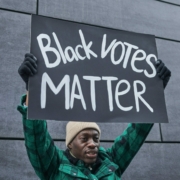How Biden Can Boost Human Rights in Egypt

In its first 100 days, the Biden administration renewed its focus on human rights. After years of internal debate, the United States declared Turkish attacks in Armenia a century ago a genocide. Senior officials also strongly condemned the military coup in Myanmar and denounced Russian President Putin’s persecution of imprisoned opposition leader Alexey Navalny. The Biden administration released an intelligence report linking Saudi Crown Prince Mohammed Bin Salman to the murder of columnist Jamal Khashoggi (although here, it should have been stronger in its response). Despite the importance of U.S. relations with China, the Biden team also adopted language from the Trump administration denouncing Chinese abuses against the Uyghurs in Xinjiang as acts of genocide. But now Biden faces another challenge: whether to renew military aid to Egypt.
Policymakers often struggle to find the right balance between promoting human rights and protecting national-security interests. Nowhere are these tensions starker than with respect to Egypt. For more than four decades, since Anwar Sadat signed the Camp David Accords, Egypt has honored its peace commitments with Israel. Egypt also plays a key role in securing vital shipping lanes through the Suez Canal and helps the U.S. counter violent extremism in the Middle East.
Since 1978, the U.S. has provided Egypt with more than $50 billion in military aid and $30 billion more in economic aid.
But on the other side of the ledger, since President Abdel Fattah al-Sisi came to power in 2013, human rights have been under assault in Egypt, as security forces have arrested and are now detaining tens of thousands of government critics on purely political grounds. Sisi has decimated the independent press and viciously attacked human-rights organizations, arresting and prosecuting activists on trumped-up charges, while forcing others into exile. The U.S. State Department’s Human Rights Report, released last month, also documents extrajudicial killings and disappearances—another aspect of what the Department calls “a litany of serious violations of human rights by Egyptian authorities.”
Responding to Egypt’s human-rights crisis, Congress has mandated that certain conditions be met before additional U.S. aid can flow. Outside of the scope of these conditions, in February, the Biden administration sent Congress a notification of a planned sale of almost $200 million in missiles to Egypt. But now it needs to decide how to respond to the Congressionally mandated human-rights conditions that apply to a separate $300 million in already-appropriated foreign military financing.
There is no doubt that Egypt has failed to meet Congress’s human-rights conditions relating to arbitrary detention, violence, and harassment—including against U.S. citizens. The only way to keep this money flowing will be for the Biden administration to apply what is called a national-security waiver. The administration would need to say that, even though human rights are not being respected in Egypt, U.S. national security interests outweigh those concerns. This is what the Trump Administration did, and many Democrats were rightly critical of that.
Subscribe to the Ethical Systems newsletter
There is no compelling national-security emergency in Egypt that warrants the Biden administration bypassing the Congressional human-rights mandate. In 2017, then-Secretary of State Rex Tillerson reached such a conclusion when he withheld a portion of U.S. military aid to Egypt in response to a draconian new law restricting non-governmental organizations. Unfortunately, this decision was later overturned by Tillerson’s successor, Mike Pompeo.
Applying the waiver would contradict Biden’s assertion as a candidate that there would be “no more blank checks for Trump’s ‘favorite dictator.’” It would send a terrible message to President Sisi, one that says a business-as-usual mindset will govern U.S. policy. And it would send a damaging signal to the rest of the world, especially to those who are under attack from their own governments and looking desperately for renewed U.S. leadership on these issues. It will play into the hands of those, like the Chinese government, who justify their own repressive policies in part by mocking U.S. hypocrisy when we support authoritarian “friends.”
Since 1978, the U.S. has provided Egypt with more than $50 billion in military aid and $30 billion more in economic aid, making it one of the largest recipients of American largesse during that period. If a core objective of this aid was to promote improved human rights practices by the Egyptian government, it has failed to deliver. In the long term, President Sisi’s autocratic rule also will undermine U.S. security interests by encouraging radicalism and leading to greater instability in Egypt and the region.
By contrast, conditioning future military aid to Egypt on the government’s respect for human rights would demonstrate the Biden administration’s commitment to those principles and communicate to Egyptian rights defenders that they have a real ally in the U.S. It also would reinforce the President’s often-stated message that, in the competition between democracies and authoritarian governments, the U.S. needs to stand with true democracies.
Michael Posner is the Jerome Kohlberg professor of ethics and finance at NYU Stern School of Business and director of the Center for Business and Human Rights. Follow him on Twitter @mikehposner.
Reprinted with permission from Forbes.
Lead image: U.S. Secretary of Defense / Flickr









